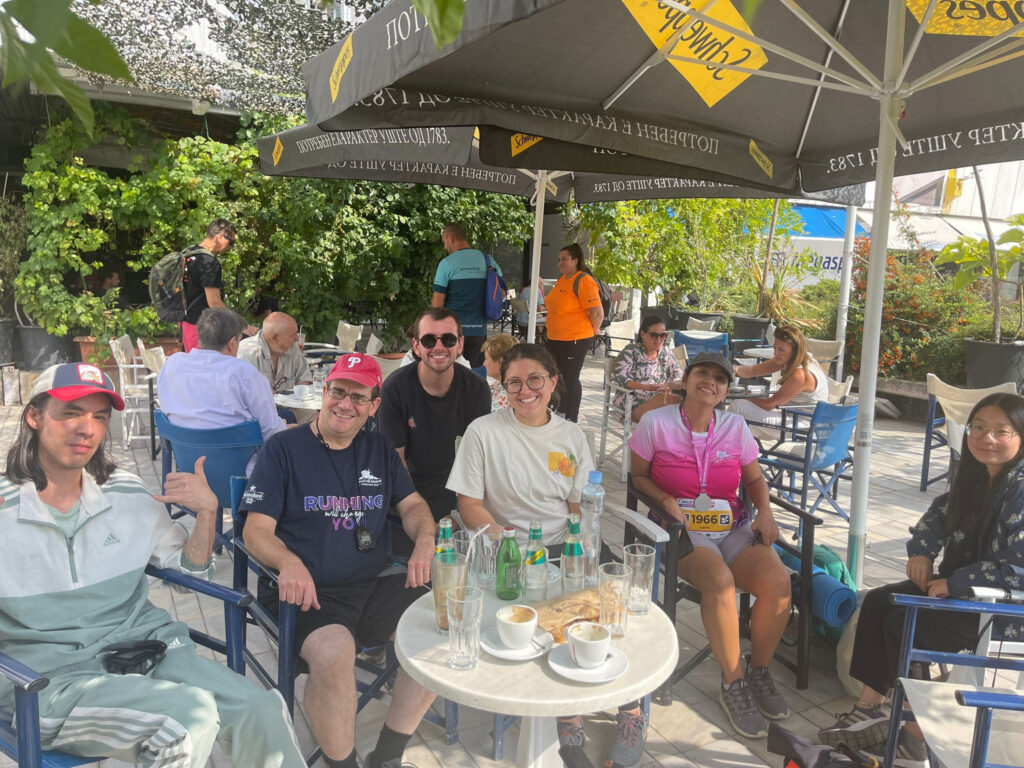My running continues to make progress. On Sunday, Oct. 1, I finished the 5K race that’s held as part of the Skopje Marathon with a chip time of 34 minutes and 53 seconds.
For those unfamiliar with running lingo, “chip time” refers to the time from when the runner crosses the starting line to crossing the finish line as measured by the electronic timing system. This system features a microchip affixed to the back of the bib number that’s usually pinned to the runner’s T-shirt. (Some runners have it on their shorts.) Chip time is distinguished from “gun time,” which starts when the starting gun is fired or horn is sounded. In a small race, there’s little difference between the two, but when there are a whole lot of people in the starting pen, it can take several minutes for the people at the back of the pen to reach the starting line. That was the case here; my gun time was 40:26.

My time in this race was a little slower than my previous 5K at the end of April. For that race, I had a chip time of 34:24 and a gun time of 34:46. However, I still see this as progress because in April, I had to take a couple of walking breaks and finishing the race was really challenging. This time, the frustrating part of the race was that the course was so crowded that I had difficulty passing the slower people. I didn’t take any walking breaks and I didn’t find it at all challenging to finish the race.
In April, I was the fastest American in the race, but there was only one other American in that race. This time, there were eight Americans faster than me, but I was surprised that I was faster than the other Peace Corps volunteers in the 5K. However, that’s because there were only four other Peace Corps volunteers in the 5K, and I was the only one of us who had been training for it. (They did all have the advantage of being about 25 years younger than me, though.) There is one other Peace Corps volunteer in my cohort who is a serious runner, but she ran in the half marathon, not the 5K. (The trainees from the next cohort who arrived Sept. 11 weren’t able to participate this year, but I expect some of them will be in next year’s race.)
Since I completed this race without any walking breaks and didn’t find it challenging, I think it’s time to move up to a 10K. I’m doing this gradually, though. On Friday, Oct. 6, I got on the treadmill and set it to 8 km/h, which is barely running. (That’s 5 mph for my American readers.) And I kept running at that pace for 45 minutes, which got me to 6 km of steady slow running.
Previously, I was running faster, but for shorter times. I was at 10.2 km/h (6.3 mph), but I would only keep that up for 12 minutes before taking a 2-minute walking break. Then I’d start running again.
I expect I’ll still have some faster running days, but my plan is to do some more slow 6 km runs, then gradually work up to running 10 km at a slow, steady pace.
On the minus side, I picked the wrong place to stay in Skopje. I booked a private room at a backpackers’ hostel for Saturday and Sunday nights, figuring this would allow me a place to shower after the race and I could return to Tetovo on Monday morning. That did work out, but I was awfully itchy on Monday and had a bunch of insect bites. I got home, took another shower and laundered everything I’d brought to Skopje. I used the anti-itch cream from the Peace Corps medical kit. But on Tuesday morning, I woke up with even more itching, so I emailed the Peace Corps medical office to ask if I should be doing anything else to treat this. I got some advice (it turns out antihistamines are useful for itching in addition to cold symptoms).
The doctor asked me to alert other volunteers not to stay at the hostel, since it was pretty clear that I got the insect bites there. And since I needed to go to the Peace Corps office to get refills of the antihistamines and anti-itch cream, he wanted to examine me while I was there. Turned out it was the worst case of insect bites he’d ever seen on a Peace Corps volunteer. Thankfully, he gave me several tubes of a more potent anti-itch cream. And the problem seems to be gone now. As of Sunday, Oct. 8, the bites are still visible, but less prominent, and they barely itch at all now.
The medical care we get in the Peace Corps is excellent. It’s not just for dealing with problems like this, but I’ve gotten some detailed advice for improving my nutrition and exercise habits. I expect I’ll leave service in substantially better health than when I started.